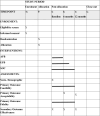Friendship Bench intervention to address depression and improve HIV care engagement among adolescents living with HIV in Malawi: Study protocol for a pilot randomized controlled trial
- PMID: 40106412
- PMCID: PMC11922207
- DOI: 10.1371/journal.pone.0302666
Friendship Bench intervention to address depression and improve HIV care engagement among adolescents living with HIV in Malawi: Study protocol for a pilot randomized controlled trial
Abstract
Background: Adolescents in Sub-Saharan Africa are disproportionately affected by the HIV epidemic. Comorbid depression is prevalent among adolescents living with HIV (ALWH) and poses numerous challenges to HIV care engagement and retainment. We present a pilot trial designed to investigate feasibility, fidelity, and acceptability of an adapted and an enhanced Friendship Bench intervention (henceforth: AFB and EFB) in reducing depression and improving engagement in HIV care among ALWH in Malawi.
Methods: Design: Participants will be randomized to one of three conditions: the Friendship Bench intervention adapted for ALWH (AFB, n = 35), the Friendship Bench intervention enhanced with peer support (EFB, n = 35), or standard of care (SOC, n = 35). Recruitment is planned for early 2024 in four clinics in Malawi. Participants: Eligibility criteria (1) aged 13-19; (2) diagnosed with HIV (vertically or horizontally); (3) scored ≥ 13 on the self-reported Beck's Depression Inventory (BDI-II); (4) living in the clinic's catchment area with intention to remain for at least 1 year; and (5) willing to provide informed consent. Interventions: AFB includes 6 counseling sessions facilitated by young, trained non-professional counselors. EFB consists of AFB plus integration of peer support group sessions to facilitate engagement in HIV care. SOC for mental health in public facilities in Malawi includes options for basic supportive counseling, medication, referral to mental health clinics or psychiatric units at tertiary care hospitals for more severe cases. Outcomes: The primary outcomes are feasibility, acceptability, and fidelity of the AFB and EFB assessed at 6 months and 12 months and compared across 3 arms. The secondary outcome is to assess preliminary effectiveness of the interventions in reducing depressive symptoms and improving HIV viral suppression at 6 months and 12 months.
Discussion: This pilot study will provide insights into youth-friendly adaptations of the Friendship Bench model for ALWH in Malawi and the value of adding group peer support for HIV care engagement. The information gathered in this study will lead to a R01 application to test our adapted intervention in a large-scale cluster randomized controlled trial to improve depression and engagement in HIV care among ALWH.
Trial registration: ClinicalTrials.gov (NCT06173544).
Copyright: © 2025 Dao et al. This is an open access article distributed under the terms of the Creative Commons Attribution License, which permits unrestricted use, distribution, and reproduction in any medium, provided the original author and source are credited.
Conflict of interest statement
The authors have declared that no competing interests exist.
Figures
Update of
-
Friendship Bench Intervention to Address Depression and Improve HIV Care Engagement Among Adolescents Living with HIV in Malawi: Study Protocol for a Pilot Randomized Controlled Trial.medRxiv [Preprint]. 2024 Apr 12:2024.04.11.24305686. doi: 10.1101/2024.04.11.24305686. medRxiv. 2024. Update in: PLoS One. 2025 Mar 19;20(3):e0302666. doi: 10.1371/journal.pone.0302666. PMID: 38645199 Free PMC article. Updated. Preprint.
Similar articles
-
Friendship Bench Intervention to Address Depression and Improve HIV Care Engagement Among Adolescents Living with HIV in Malawi: Study Protocol for a Pilot Randomized Controlled Trial.medRxiv [Preprint]. 2024 Apr 12:2024.04.11.24305686. doi: 10.1101/2024.04.11.24305686. medRxiv. 2024. Update in: PLoS One. 2025 Mar 19;20(3):e0302666. doi: 10.1371/journal.pone.0302666. PMID: 38645199 Free PMC article. Updated. Preprint.
-
Improving HIV Prevention Among Heterosexual Men Seeking Sexually Transmitted Infection Services in Malawi: Protocol for a Type I Effectiveness-Implementation Hybrid Randomized Controlled Trial of Systems Navigator-Delivered Integrated Prevention Package (HPTN 112-NJIRA Study).JMIR Res Protoc. 2025 Jun 18;14:e72981. doi: 10.2196/72981. JMIR Res Protoc. 2025. PMID: 40531570 Free PMC article.
-
A Virtual Self-Management Intervention for Adolescents With Juvenile Idiopathic Arthritis: Protocol for the VISTA-JIA Randomized Controlled Trial.JMIR Res Protoc. 2025 Jun 27;14:e69539. doi: 10.2196/69539. JMIR Res Protoc. 2025. PMID: 40577780 Free PMC article.
-
Brief educational strategies for improving contraception use in young people.Cochrane Database Syst Rev. 2016 Mar 30;3(3):CD012025. doi: 10.1002/14651858.CD012025.pub2. Cochrane Database Syst Rev. 2016. PMID: 27027480 Free PMC article.
-
Psychological therapies for treatment-resistant depression in adults.Cochrane Database Syst Rev. 2018 May 14;5(5):CD010558. doi: 10.1002/14651858.CD010558.pub2. Cochrane Database Syst Rev. 2018. PMID: 29761488 Free PMC article.
References
-
- UNICEF. Key HIV epidemiology indicators for children and adolescents aged 0-19, 2000-2022. 2023.
-
- UNICEF. HIV Statistics - Global and Regional Trends. In: UNICEF DATA [Internet]. 2023 [cited 28 Jul 2023]. Available: https://data.unicef.org/topic/hivaids/global-regional-trends/
-
- World Health Organization. Mental health of adolescents. 2021. https://www.who.int/news-room/fact-sheets/detail/adolescent-mental-health
Publication types
MeSH terms
Associated data
Grants and funding
LinkOut - more resources
Full Text Sources
Medical


